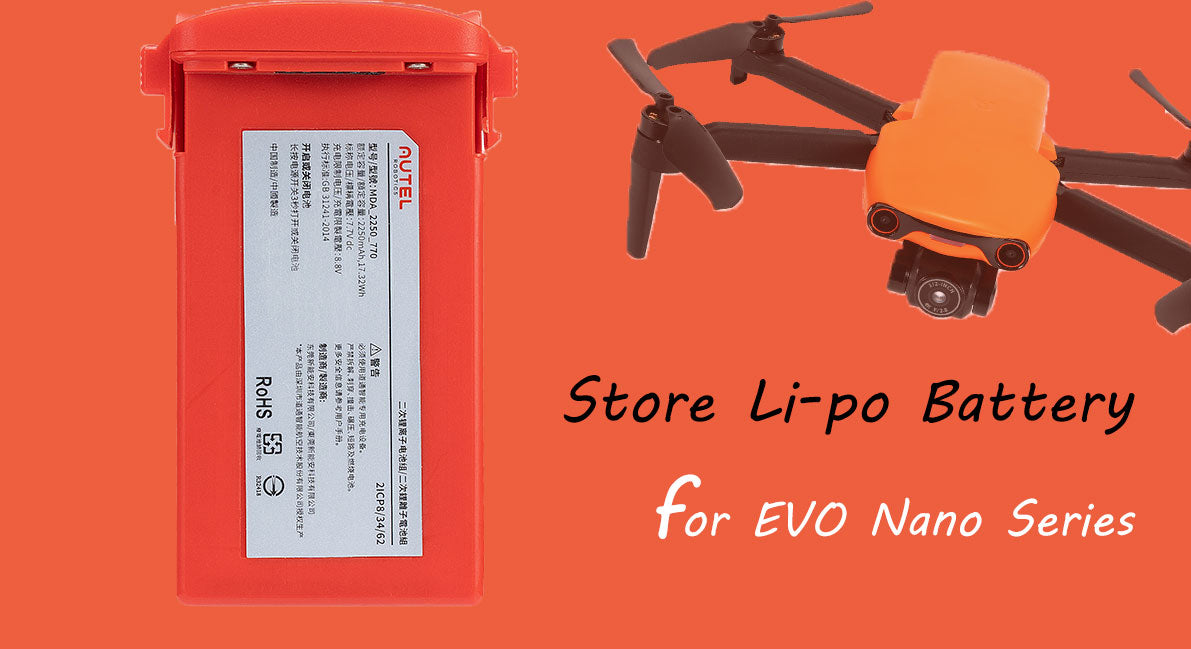Drones bring an unprecedented aerial photography experience, and drone batteries are an important part of drone flight, directly affecting the flight time, performance and stability of drones.
Whether it is a camera drone, FPV drone or a professional commercial drone, drones rely on drone lithium batteries as a driving force to support drones. Here, let's fully understand everything about drone lithium batteries.
What is a lithium polymer (LiPo) battery?
Lithium polymer batteries (LiPo) are widely used in drone aircraft. LiPo batteries are light in weight, high in energy density and fast in discharge rate, which are very suitable for supporting high-speed and high-maneuverability flight of drones. Even a small drone quadcopter can fly for more than 20 minutes with a drone weight of no more than 250g.
Battery cells of LiPo batteries
LiPo batteries are composed of multiple cells, and the number of cells determines the voltage of the battery. Common battery specifications for FPV drones include 2S (7.4V), 3S (11.1V), 4S (14.8V) and 6S (22.2V). Most of the batteries used in camera drones are 3S (11.1V) and 4S (14.8V). The higher the voltage, the faster the motor rotates, so choosing the right number of battery cells can affect the flight speed and performance of the drone.
Lithium battery capacity
The capacity of the battery is usually expressed in milliampere hours (mAh). The larger the capacity, the longer the flight time of the drone. Usually the battery capacity of FPV drones is usually between 500mAh and 3000mAh, and the battery capacity of consumer drones is usually between 2000mAh and 7000mAh. For a drone with a flight time of half an hour, the drone lithium battery capacity is at least more than 5000mAh.
FPV drone lithium battery discharge rate
The discharge rate determines how quickly the battery can release power. The C value of FPV drone batteries is usually between 30C and 100C. The higher the C value, the more current the battery can release in a short time, which is suitable for flights with high power requirements (such as racing and stunts). For example, a 1500mAh, 50C battery can continuously provide 75A of current output.

Smart Battery Management System for Camera Drones
High-end camera drone are equipped with a smart battery management system (BMS), which monitors the battery status in real time, including power, voltage, temperature, discharge rate, etc., to ensure that the battery operates within a safe range. It can also automatically calculate the flight time and prompt the user to return to prevent the drone from falling due to low power. DJI and Autel drones both have long-lasting lithium batteries.

How to choose a lithium-ion battery for my drone?
DJI and Autel Robotics produce the world's top consumer drones, and the drones are equipped with original smart flight batteries and cannot be adapted to other brands. If you are a DIY drone enthusiast or a DIY FPV drone enthusiast, you need to pay attention to the balance between weight and endurance, voltage matching, safety, discharge rate, size and weight, connector type, and flying style when choosing a LiPo battery.
Maintenance and care of drone LiPo batteries:
Although LiPo batteries have powerful performance, special attention should be paid to safety during use. During the re-discharge process of using LiPo batteries, storing LiPo batteries, and regularly checking and maintaining LiPo batteries, you need to pay attention to avoid expansion and explosion.
Reasonable charging and discharging
Avoid overcharging or overdischarging. When charging LiPo batteries, do not exceed 4.2V/cell, and when discharging, do not go below 3.3V/cell. Use a charger with a balancing function to charge and ensure that the voltage of each cell is consistent. Do not charge the drone battery when it is hot.
When using the drone, avoid long-term high-speed driving and avoid flying at extreme temperatures, so as to better protect the drone LiPo battery.
Storage voltage
If the battery is not used for a long time, it is recommended to keep it within the storage voltage range (3.7V-3.85V/cell) and the power level above 80% to extend the battery life. Please store in a ventilated, dry and cool environment.
Inspection and protection
Check the appearance of the battery regularly, avoid using batteries that are swollen, damaged or leaking, and use fireproof bags to store the battery to prevent accidents.
How to use lithium polymer batteries safely?
Although LiPo batteries have powerful performance, special attention should be paid to safety during use. First, avoid overcharging or discharging. Usually the voltage should be kept between 3.7V and 4.2V. Secondly, use a dedicated LiPo charger when charging, and the charging environment should be dry and ventilated. Avoid short circuits, physical damage, and high temperature exposure during operation, otherwise it may cause fire or explosion. The appearance of the battery should also be checked regularly when using it, and swollen and damaged batteries should be stopped immediately.
How long can a fully charged lithium polymer battery be stored?
LiPo batteries should not be stored for a long time when fully charged, because this will accelerate the aging of the battery and increase internal chemical pressure. It is generally recommended that fully charged LiPo batteries be used within 1-2 days. If not used for a long time, the battery should be kept at the storage voltage, that is, about 3.7V-3.85V per cell, to extend the battery life.
View More: FAQ & Tips for Autel EVO Drone Battery Charging
How to store lithium polymer batteries?
LiPo batteries should be stored within the storage voltage range (3.7V-3.85V) to avoid full charge or full discharge. The environment for storing batteries should be dry, ventilated, cool, and avoid high temperature and humidity. It is recommended to put the battery in a fireproof bag or explosion-proof box to prevent accidents. In addition, check the battery status regularly to ensure that they are not swollen, leaking, etc.

View More: How To: Maintain and Store Your Autel EVO Nano Battery
How to deal with over-discharged LiPo batteries?
Over-discharge can cause irreversible damage to LiPo batteries. When the battery voltage is below 3.0V/cell, the ability to recover the battery becomes very limited. If the battery is over-discharged, try not to use the normal charging mode to force charge, and try to use the low current slow charging mode to restore the voltage. If the battery cannot recover to normal voltage or the performance is significantly reduced, it should be considered to be eliminated.
Can I take LiPo batteries on the plane?
When traveling with a drone, the drone can usually be taken on the plane, but the drone must be separated from the drone LiPo battery. According to the International Air Transport Association (IATA) regulations, batteries with a capacity of less than 100Wh are generally allowed in carry-on luggage, and most camera/FPV drone batteries meet this standard.
Batteries with a capacity between 100Wh and 160Wh require airline approval, and each person can only carry a maximum of two such batteries. Batteries with a capacity of more than 160Wh are generally prohibited from carry-on or checked luggage. All batteries should be carried on board, and the electrodes should be properly protected to prevent short circuits.
More details: Can I Take A Drone On A Airplane?
FAQ
What should I do if a LiPo battery catches fire?
If a LiPo battery catches fire, the first step is to stay calm and use a fire extinguisher immediately. It is recommended to use an ABC dry powder fire extinguisher or a carbon dioxide fire extinguisher. If a fire extinguisher is not available, sand or a high-temperature resistant cloth can be used to cover the fire area.
Never use water directly to extinguish the fire, as water reacts with the chemicals inside the battery and intensifies the fire. Keep a safe distance after the battery catches fire to avoid inhaling harmful fumes.
What is the life of a LiPo battery?
The life of a LiPo battery is usually between 300 and 500 charge and discharge cycles, but the actual life depends on usage habits. Avoiding overcharging and discharging and physical damage, and storing the battery correctly can extend its life. In addition, using a low-rate charging mode and operating at an appropriate temperature can also help increase the battery's service life.
How to deal with lithium polymer batteries?
LiPo batteries should not be discarded at will after their lifespan ends or they are in poor condition, because they contain harmful chemicals that may pollute the environment. Before handling, make sure that the battery is fully discharged to avoid short circuits or fires during handling. Many countries and regions have special e-waste recycling points that can safely dispose of used LiPo batteries.
Conclusion
Lithium polymer batteries provide powerful power and endurance for drones, but they also require users to operate them safely and handle them properly. Proper use, storage and disposal of LiPo batteries can not only extend battery life, but also ensure flight safety and environmental protection. Being familiar with the characteristics and usage specifications of LiPo batteries is not only the responsibility of drone enthusiasts, but also the key to ensuring the fun of flying.








